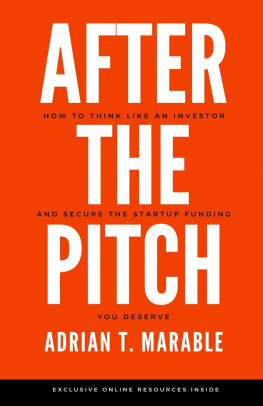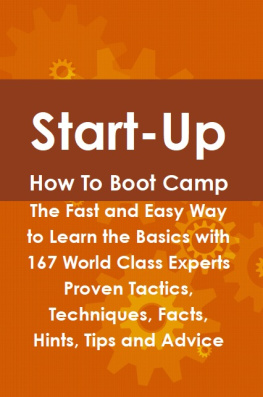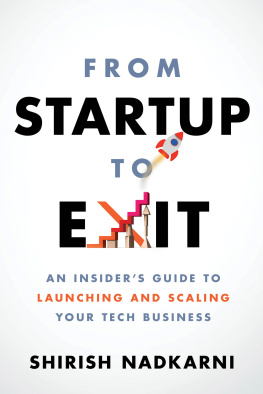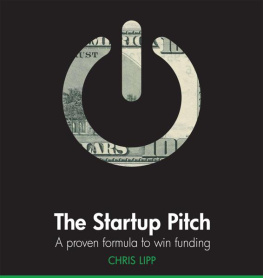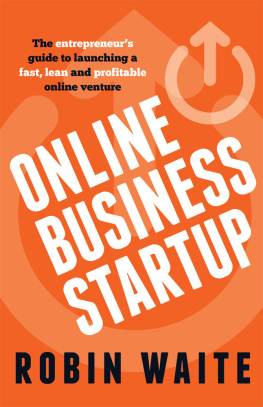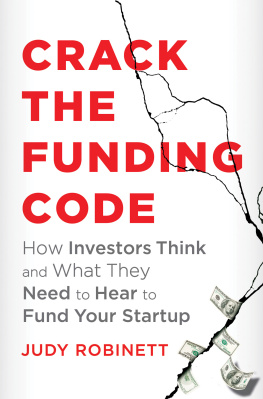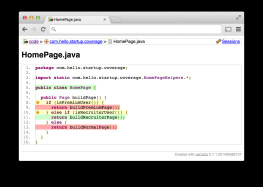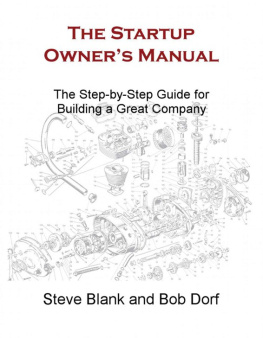The Postlude
The Grand Finale
I began this book with the following statement:
If you arent frantically underlining, highlighting or taking notes as you read each chapter, then I have not achieved my goal for this book.
I welcome your comments to that end. Contact me anytime at rob@softwarebyrob.com.
To ask a question, make a comment or purchase the print, ebook or audio version of this book, visit www.StartupBook.net
Until next time.
A Final Note about the Micropreneur Academy
With my colleague Mike Taber, I run an online startup community called the Micropreneur Academy (www.Micropreneur.com).
The Micropreneur Academy is a paid online learning environment and community website for startup founders.
Although this book contains a small amount of material from the Micropreneur Academy, it only covers topics that are conducive to the printed page.
The purpose of the Micropreneur Academy is to present topics that require interactive elements (screencasts, audio, and worksheets), topics that change frequently, cutting-edge approaches and our complete Rolodex of vendors and contractors. In addition it provides a community of like-minded startup founders accessible via private forums.
If you are interested in launching or growing your startup faster, as an owner of this book you are entitled to the first month of the Academy at no charge. To receive your free month visit www.Micropreneur.com/book/
Chapter 1
The Chasm Between Developer and Entrepreneur
What is an Entrepreneur?
An entrepreneur is a visionary.
He is the person who sees the potential in an idea and creates a viable business from nothing.
She is the person who invests hundreds of hours into building, launching and marketing a product, fighting through every roadblock along the way.
In this book well cover the approaches of two types of entrepreneurs:
Micropreneurs Entrepreneurs who want to remain solo. This means no employees under any circumstance. Micropreneurs might own a single product, or may own many products that collectively contribute to their bottom line. A specific lifestyle is the goal of a Micropreneur.
Bootstrappers A bootstrapper has their vision set on something larger than a single person venture. Perhaps 5 employees, perhaps 10a bootstrapper has an idea and knows she must execute and grow her company to survive.
It so happens that 90% of the knowledge needed to succeed at Micropreneurship and bootstrapping is identical. Finding a niche, finding a product, building, launching, marketingits the same process.
In this book I will point out a handful of places where the two paths diverge and call out the recommended approach based on the path youre following.
Why the Anti-Venture Capital Stance?
I wanted to address this early so youre clear on the focus of this book.
I am not anti-venture capital. I am anti-everyone-thinking-venture-capital-is-the-only-way-to-start-a-tech-company.
Seeking funding of any kind creates two problems.
First, it involves a massive investment of time and focus, which distracts you from the important things, like making money and staying in business.
Second, it makes modest success nearly impossible due to the limits it places on the potential markets you can pursue.
If youre self-funded with one or two founders, you can support your entire business from a tiny niche that provides $10k/month in revenue.
But with venture capital (or even a few hundred thousand in angel funding) you are forced to go after much larger markets. And a market thats 10x the size is 100x harder to get right. Theres more competition, more complexity, higher advertising rates, more SEO competition, and a more fragmented audience.
Targeting a large, non-niche market is expensive in terms of marketing and support. It will eat you alive if you tackle it from the start.
But if you start small and make a product so good that your niche is falling all over itself to sign up, word will spread and you will soon find yourself with a product that extends beyond your tiny niche.
However, this takes time to grow organically; an approach that outside funding does not allow.
A Look at the Self-Funded Startup Entrepreneur
There are many definitions of entrepreneur, but since well be discussing self-funded tech startups we are going to focus our definition on a few key points:
Point 1: An entrepreneur is a technical visionary who creates software for a niche market.
Niche markets are critical. If you want to self-fund a startup you have to choose a niche.
Building an online invoicing software as a service (SaaS) application? Good luck.
Building an online invoicing application targeted at landscape architects? Now youre talking.
The genius of niches is they are too small for large competitors, allowing a nimble entrepreneur the breathing room to focus on an underserved audience. Once youve succeeded in that niche, you can leverage your success to establish credibility for your business to move into larger markets.
Point 2: An entrepreneur merges existing technical knowledge with online marketing knowledge.
The key factor in an entrepreneurs success is their ability to market their product. I can almost hear you groaningbut keep an open mind. Millions of people in this world can build software. A fractional subset of those can build software and convince people to buy it.
A developer who knows how to market a product is a rare (and powerful) combination.
Point 3: An entrepreneur is a cross between a developer, a webmaster, and a marketer.
Developer
Software entrepreneurship would be nearly impossible without the technical skills we learn as developers. The ability to fix a production site thats crashing or put together a hot fix for a key customer will be critical to your success.
Webmaster
These days its imperative that your startup knows how to sell online. This means creating a website that converts visitors into customers. Well be exploring a number of ways to build high-converting sales websites, and doing these will require basic HTML knowledge.
Once your website is up, you will be making constant updates, adding new content to achieve better search engine rankings, tweaking conversions (newsletter sign-ups, trials, purchases, etc) and most of these tasks will be better executed if you can make small changes yourself. Basic knowledge of HTML or a CMS is essential.
Marketer
Marketing is more important than your product.
Let me say it another way:
Product Last. Marketing First.
Your product has to be good. If its not, youll be out of business.
But before you build a good product you have to find your market. With an enormous amount of anecdotes to back me up I strongly believe that building something no one wants is the most common source of failure for entrepreneurs.
In well look at how to make sure people want what youre building before you build it.
Self-funded vs. Venture-funded
Self-funding your startup is worlds apart from what most people talk about in the tech startup world.
Venture-backed startups typically raise capital from outside investors with the goal of massive, accelerated growth. They attack large, growing markets with the hopes of 100x growth in 5 years or less.
Examples abound, but think along the lines of Netscape, Google, Travelocity, Yelp, Twitter and Facebook. Big dollars. Fast growth. High risk.


